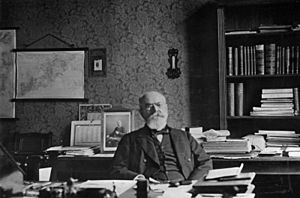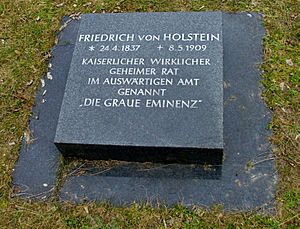Friedrich von Holstein facts for kids
Friedrich August Karl Ferdinand Julius von Holstein (born April 24, 1837 – died May 8, 1909) was an important government official in the German Empire. For over 30 years, he led the political department of the German Foreign Office. He played a big part in guiding Germany's foreign policy after Chancellor Bismarck left office in 1890.
Contents
Who Was Friedrich von Holstein?
Friedrich von Holstein was born in Schwedt, a town in Province of Brandenburg, on April 24, 1837. His father was a military officer from Prussia. Friedrich studied law at the Frederick William University in Berlin and finished his studies in 1856.
Early Career in Diplomacy
After university, Holstein joined the diplomatic service. In 1860, he became an assistant at the Prussian embassy in Saint Petersburg, working under Otto von Bismarck. He then worked in other legations (diplomatic missions) in cities like Rio de Janeiro, London, Washington, Florence, and Copenhagen.
When the German Empire was formed in 1871, Holstein became a secretary at the embassy in Paris. He returned to Berlin in 1876 and started working at the Auswärtiges Amt (Foreign Office). He became a key person there, even though Bismarck sometimes called him a "hyena" behind his back.
Shaping German Foreign Policy
Holstein's influence grew a lot after Bismarck was removed from his position in 1890. The new chancellor, Leo von Caprivi, didn't know much about foreign affairs. Because Holstein understood Bismarck's past policies so well, he became very important.
Holstein was known as a clever and sometimes tricky person. He preferred to work behind the scenes rather than being in the public eye. This was partly because of a past scandal involving a diplomat named Harry von Arnim, which had made Holstein some powerful enemies.
As the Political Secretary to the Foreign Office, Holstein guided Germany's policies in the 1890s. He was largely responsible for Germany gaining control of Tsingtao (now Qingdao) in China and also for acquiring Samoa. He learned how to carry out his plans from Bismarck. However, he sometimes didn't see the long-term effects of his decisions.
For example, he made mistakes when Germany ended an important agreement with Russia in 1890. His policies in China and his role in the Moroccan crisis in 1906 also caused problems. He advised the Kaiser (German Emperor) to travel to Tangier to protest against other countries trying to isolate Germany. Holstein later disagreed with how Germany handled the Morocco situation, believing it would only make Britain and France closer. He resigned from his position in April 1906.
Later Years and Legacy
Until the end of his life, Holstein believed that Germany would not be truly safe until it had a good relationship with Britain. This belief shaped his views on expanding the Imperial Navy. He thought that building too many new ships would upset southern Germany, cost too much money, and make other countries suspicious of Germany. He argued that if Britain built two ships for every one Germany built, Germany's naval power wouldn't actually increase.
Friedrich von Holstein passed away on May 8, 1909, in Berlin. He was buried in the Invalidenfriedhof Cemetery. He had many secret files about German politicians, which were not made public until 1956.
Awards and Recognition
- Commander of the Imperial Austrian Order of Franz Joseph, with Star, in 1878.
See Also
 In Spanish: Friedrich von Holstein para niños
In Spanish: Friedrich von Holstein para niños
- Fall of Eagles; he is shown in the 3rd episode under the name "Holstein."
 | May Edward Chinn |
 | Rebecca Cole |
 | Alexa Canady |
 | Dorothy Lavinia Brown |



